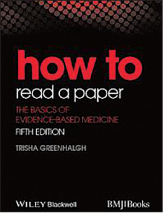Translate this page into:
How to read a paper: The basics of evidence-based medicine
This article was originally published by Wolters Kluwer and was migrated to Scientific Scholar after the change of Publisher.

Author: Trisha Greenhalgh
Publisher: Wiley BMJ Books
Year: 2014
Pages: 261
ISBN: 978-1-118-80096-6
Edition: 5th Ed
Price: $ 45.55
Professor Trisha Greenhalgh is an internationally recognized academic in primary health care and a nonprincipal general practitioner in North London. She has authored over 675 papers, which have been cited more than 23,000 times. The first edition of this book was published in 1996, the success of which coupled with the changing trends has seen the 5th edition published now in 2014. It has also been translated in several other languages. Her many awards and prizes include, Order of the British Empire for Services to Medicine, National Institute for Health Research Senior Investigator Award, Royal College of General Practitioners Research Paper of the year award (twice) and European Health Management Association Baxter Prize for Outstanding Contribution to Research in Healthcare Management (twice).
“How to read the paper” is a must read in this era of evidence based medicine for everyone. As the author has rightly said it’s very important for students to know the nitty kitty of reading, evaluating and imbibing in them to carry the research and eventually write a paper and secondly for the critics of evidence-based medicine who need to understand the political, ideological and pedagogical place of evidence-based medicine.
The book is very well-written in an organized and simplified manner starting from the basics of the literal meaning to the need of reading papers and going about describing the manner in which literature should be searched, accessed, evaluated and the methods of carrying out various studies emphasizing on their hierarchy.
It focuses on the quality of the study, methods to maintain it and the statistics involved. It explains the papers reporting trials of simple and complex interventions and screening trials with excellent examples and in depth views.
Most importantly it addresses the need of the hour, the systematic reviews and a meta-analysis, and explains exactly what these papers tell us, what to expect, the cost, the research, the quality and the data beyond numbers.
For the 21st century clinician, it addresses to the application of the evidence into practice with patients and eventually its criticisms.
The contents are:
Why read papers at all?
Searching the literature.
Getting your bearings: What is this paper about?
Assessing methodological quality
Statistics for the non-statistician
Papers that report trials of drug treatments and other simple interventions
Papers that report trials of complex interventions
Papers that report diagnostic or screening tests
Papers that summarize other papers (systematic reviews and meta-analysis)
Papers that tell you what to do (guidelines)
Papers that tell you what things cost (economic analysis)
Papers that go beyond numbers (qualitative research)
Papers that report questionnaire research
Papers that report quality improvement case studies
Getting evidence into practice
Applying the evidence with patients
Criticisms of evidence-based medicine.
This book is highly recommended for everyone interested in and related to scientific research as it has very well-written sections in tabular form and references given for easy and convenient reading. It is a must read for postgraduate students doing and studying research methodologies in any faculty of health care, and most certainly a nonnegotiable for imminent authors and researchers, planning their projects.
Source of Support:
Nil.
Conflict of Interest:
None declared.





